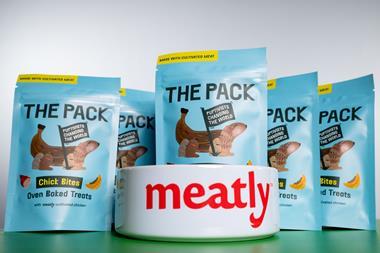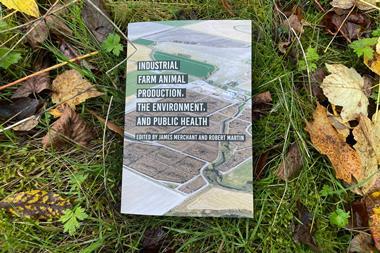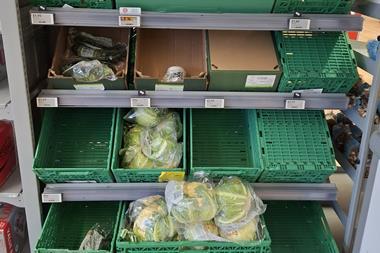
UK cultivated meat business Meatly is a step closer to bringing its lab-grown petfood to market, after a successful feeding trial revealed its Meatly Chicken was safe and “highly palatable” for dogs.
Meatly said its voluntary trials, conducted by Treat Therapeutics, featured 31 privately owned pet dogs made up of 14 different breeds from across the UK.
They involved at-home feeding observations, including surveys with dog owners to assess response to the product and veterinary checks, Meatly said. The product tested was a complete diet containing only cultivated chicken and plant-based ingredients.
Two separate trials were conducted: a single-day trial where the selected dogs were provided Meatly petfood for both meals of the day, and another more comprehensive two-week controlled trial, with a placebo group fed just a plant-based diet, that saw selected dogs given Meatly pet food for seven days straight, after an adaptation phase.
Overall, dogs were found to enjoy Meatly petfood as much, or in some cases more, than their normal diet, indicating the high taste properties of cultivated meat, the brand said.
For example, some 50% continued licking the bowl following meal completion, 75% reported higher enjoyment than their dog’s baseline diet, and 75% started their meal immediately or within the first few seconds of being presented.
Meatly Chicken also improved the palatability of the plant-based placebo diet, the business added, while there were “no significant adverse effects of feeding cultivated meat diets over the 134 recorded meals”.
The trial paves the way for the petfood to launch into retail early next year. It comes less than six months after Meatly became the first and only cultivated meat company to secure regulatory clearance to sell its lab-grown petfood in the UK, by the FSA, Defra and the Animal and Plant Health Agency.
This followed the announcement of its “ground-breaking” formulation in May, which was “substantially more affordable than the standard industry media” and could be used in industrial processes.
Cultivated meat for human consumption is yet to gain regulatory clearance. However, the FSA last month announced the creation of a new, fast-track “sandbox” programme, establishing a dedicated team to gather “rigorous scientific evidence” on cell-cultivated products and the technology behind them.
Read more: Lab-grown meat: FSA hails tipping point as approval is granted for ‘sandbox’
“These results confirm the product’s quality after the extensive safety and nutritional analysis data that the company collected over the past two years,” Meatly said.
“Nutritionally, the Meatly Chicken protein profile is comparable to traditionally reared chicken breast, containing all the essential amino acids in similar amounts, as well as the important fatty acids, minerals and vitamins for pet nutrition.”
Owen Ensor, the founding CEO of Meatly, said: “Dogs will tell you if they don’t like the food you’ve served them – so we’re ecstatic the pets in this trial enjoy Meatly Chicken even more than we thought they would.”
The results also demonstrated “we can feed our pets truly sustainable and kinder meat without compromising on taste or nutritional values”, he added. “We look forward to working towards our next milestone in the next few months – launching our first ever cultivated meat product to market.”
In addition to finalising the trial results, Meatly has also concluded its latest undisclosed funding round. This included follow-on investment from Pets at Home, as well as new incoming investors, including DSM-Firmenich Venturing, JamJar, and Joyful Ventures.
This latest development would help support Meatly’s plans to launch with its first brand partner in Q1 of 2025, it said.
“Demand for meat around the world, from both humans and our pets, is far outgrowing supply, at huge cost to the planet,” said investor Jim Mellon, founder of Agronomics.
“The work and progress that Owen and the team at Meatly have made this year has been truly impressive, achieving incredible cost reduction, regulatory approval and now another financing to support the launch of its first product.”



















No comments yet